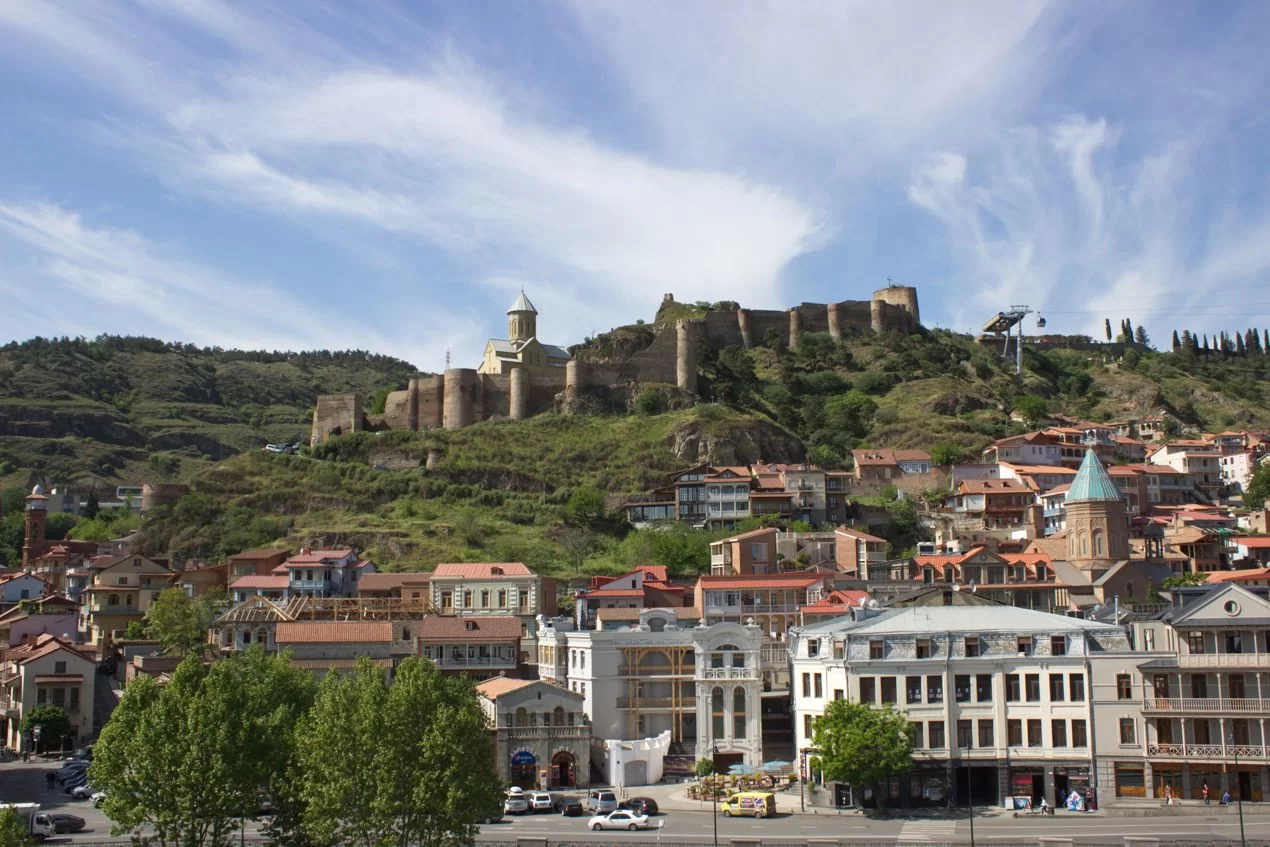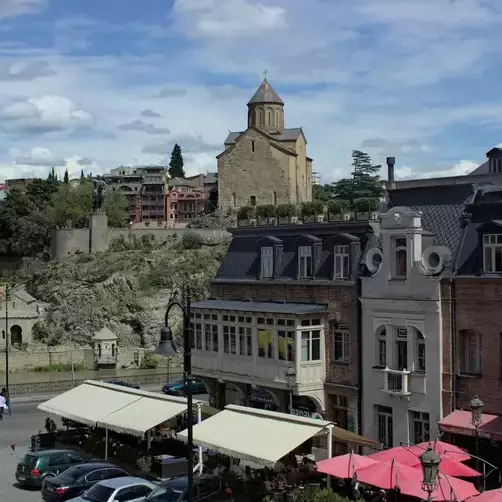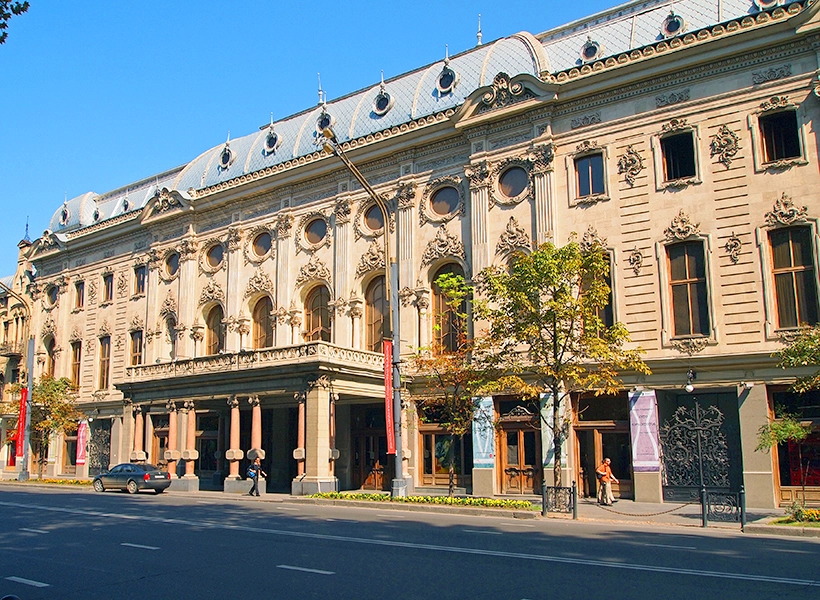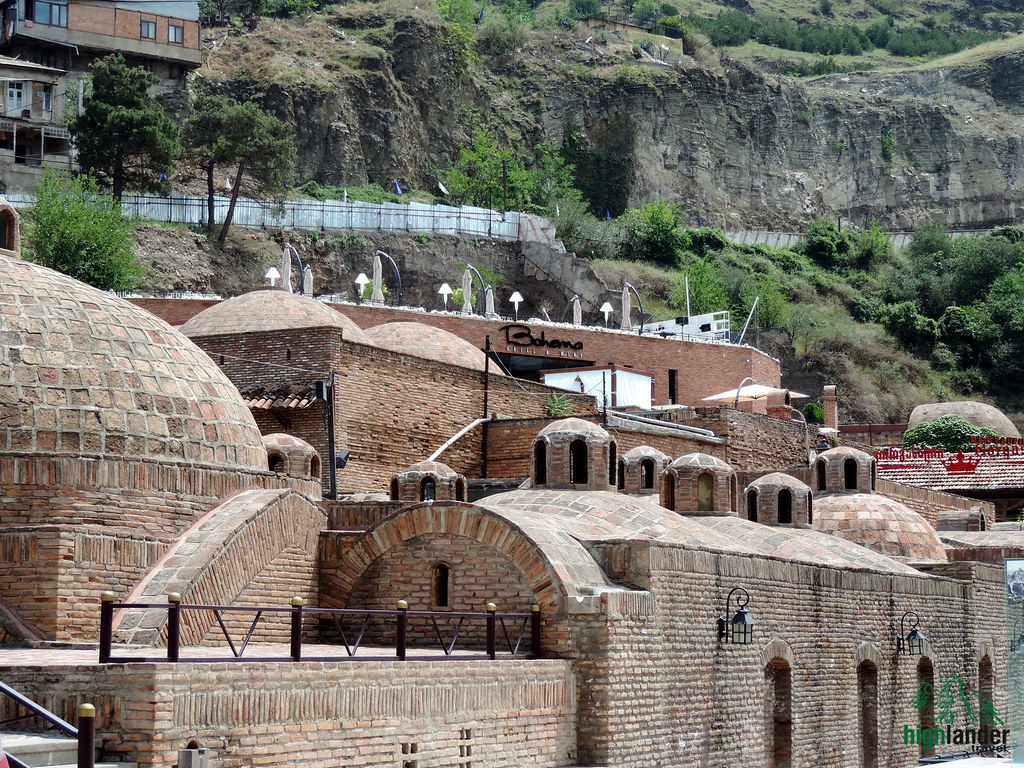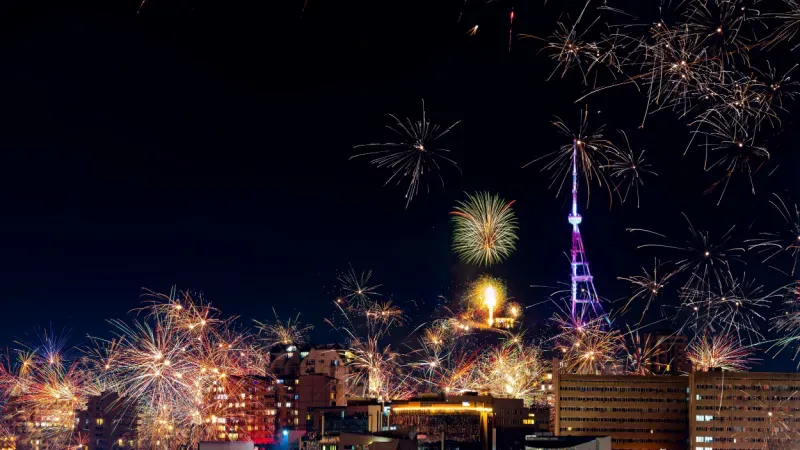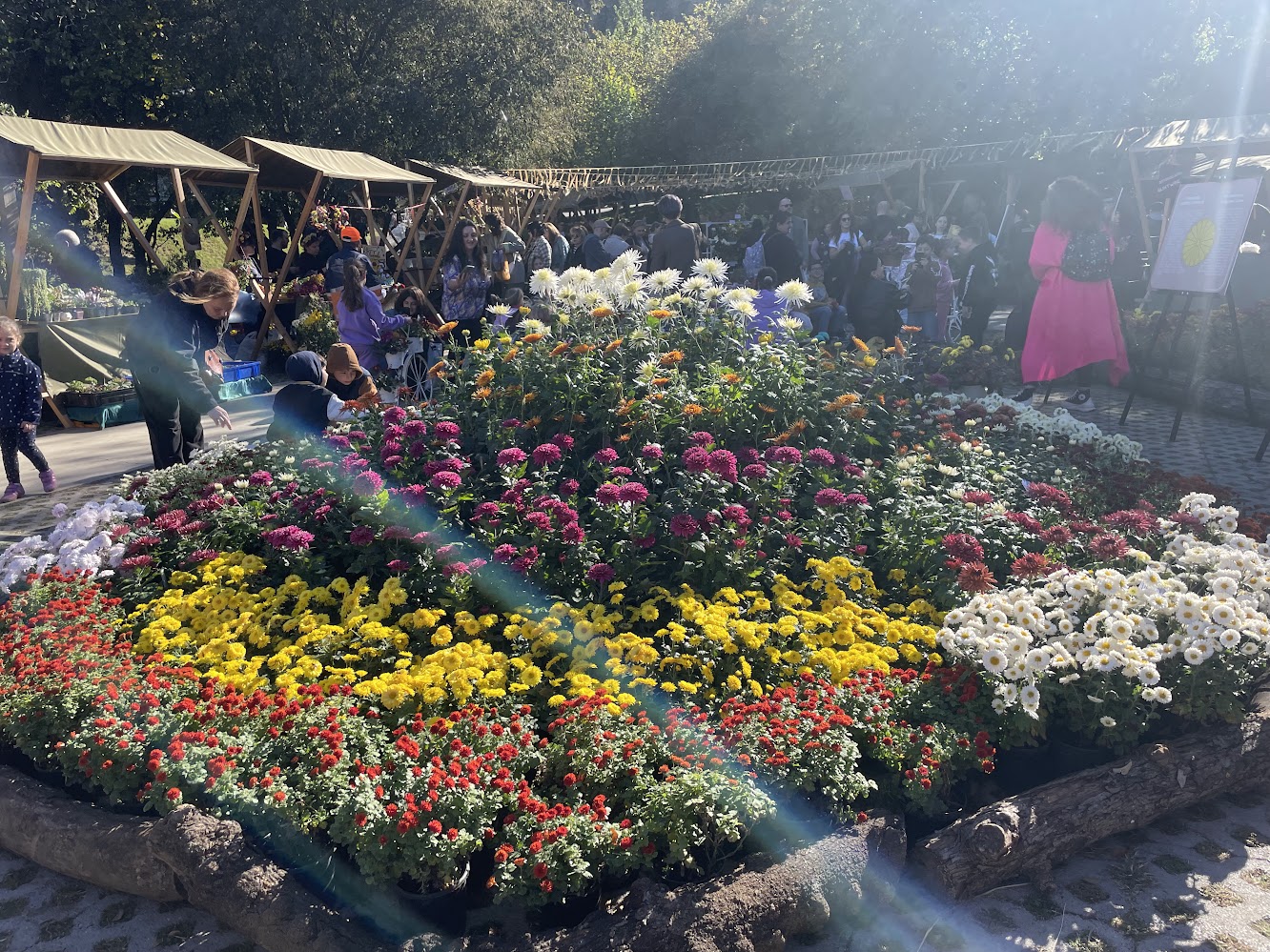Tbilisi
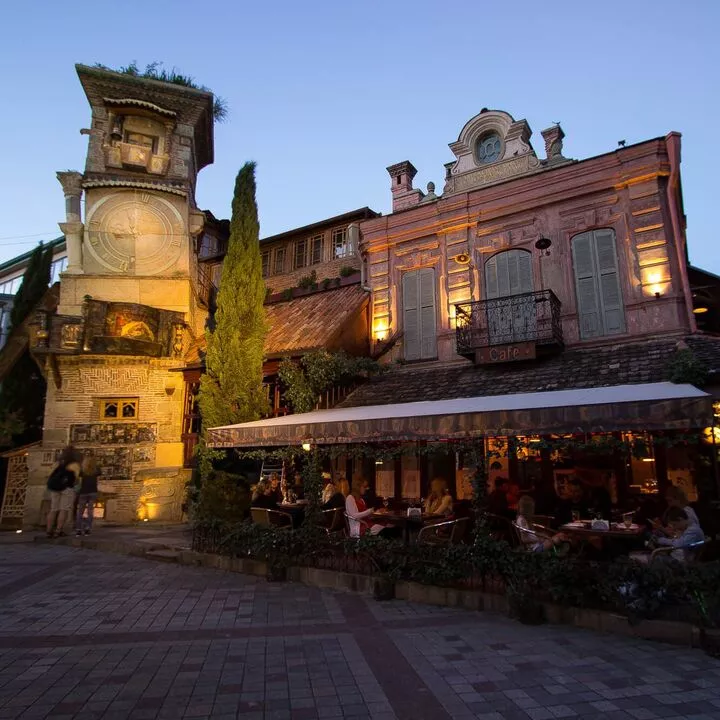
Where sulfur baths steam beneath crumbling balconies, wine bars hide in ancient cellars, and a city that’s seen everything refuses to take itself too seriously
Tbilisi is the kind of city that draws you in, reveals itself slowly, then gets right under your skin. Dripping with tradition yet effortlessly cool, Tbilisi is suave and chaotic, charming and eccentric all at once.
This isn’t one of those capitals that hits you with obvious grandeur. Tbilisi makes you work for it. The first impression might be crumbling Soviet buildings and chaotic traffic. But turn a corner and you’ll find yourself in a cobblestone alley where wooden balconies lean over Ottoman-era sulfur baths, while an ultra-modern glass bridge curves overhead.
That’s Tbilisi—a city that shouldn’t work but somehow does. Where grandmothers sell herbs on street corners beneath brutalist concrete towers. Where medieval churches sit next to hipster wine bars. Where you can soak in 2,000-year-old hot springs at 6 AM, eat khinkali at a Soviet cafeteria for lunch, and dance in one of Europe’s best techno clubs until sunrise.
For most travelers, Tbilisi becomes the main gateway to Georgia. But don’t just pass through. This city deserves your time.
The Legend: How Tbilisi Got Its Name
Our capital is a very old city. According to the common legend, it was founded by King Vakhtang Gorgasali in the late 5th century.
King Vakhtang was keen on falcon hunting. One day he and his men were hunting near the Mtkvari River. The king’s favorite falcon captured a pheasant and injured it. The pheasant managed to fly from the falcon but fell into a hot sulfur spring and was boiled. The falcon, chasing its victim, also fell into the hot water and didn’t survive.
The king’s men found these hot sulfur springs near the river. King Vakhtang was so impressed that he ordered a new city to be built around these thermal springs and called it Tbilisi—because tbili means “warm” in Georgian.
Tbilisi, by King Vakhtang’s order, became the capital of Georgia. And so it remains, 1,500 years later. Those same hot springs? They’re still flowing beneath the Old Town, and you can still bathe in them today.
Tbilisi or Tiflis?
Tourists from some countries are often confused about the name and ask: Is it correct to say Tbilisi or Tiflis? Let’s clear this up.
As mentioned above, Tbilisi stands for “warm” in modern Georgian. In old Georgian, the pronunciation was TFili. The combination of consonants “TF” is very difficult to pronounce for Turkish speakers, so in Turkish, the city became known as Tiflis. Many other languages, including Russian in the 19th century, adopted this name.
Before 1936, the official name in many languages was Tiflisi. But in 1936, the name officially changed to match the Georgian pronunciation: Tbilisi.
So both names refer to the same city, but Tbilisi is the correct modern name. If you see “Tiflis” in old books or maps, now you know why.
Why Visit Tbilisi?
Because this is where Georgia’s heart beats loudest.
Yes, the mountains are spectacular and the wine regions are beautiful. But Tbilisi is where you understand Georgian culture—the way food and wine aren’t just sustenance but social glue, the way hospitality isn’t a tourist slogan but a deeply held value, the way a nation that’s been invaded dozens of times somehow maintained its identity through sheer stubbornness and joy.
Tbilisi doesn’t look like other capitals. There’s no grand palace or pristine historic center. Instead, you get layers: Persian bathhouses beneath Soviet apartment blocks beneath medieval fortresses beneath glass-and-steel bridges. The city has been destroyed and rebuilt so many times that it stopped caring about architectural purity and just said “yes” to everything. The result is gloriously, chaotically beautiful.
Here’s what makes Tbilisi essential:
The Old Town is genuinely atmospheric. Not Disney-reconstructed atmospheric—real atmospheric. Wooden balconies sag over narrow cobblestone streets. Stray cats sleep in doorways. Grape vines climb crumbling walls. You’ll get lost. That’s part of the charm.
The sulfur baths are unlike anywhere else. These aren’t spas—they’re hot sulfur springs that have been flowing for millennia, now channeled into beautiful Persian-style bathhouses in the Abanotubani district. You haven’t experienced Tbilisi until you’ve sweated in a steamy tile room while a Georgian man scrubs you raw with a rough mitt, then dumps cold water over your head. It’s therapeutic, traditional, and utterly unique.
The food scene punches above its weight. Tbilisi has restaurants where you can eat like royalty for €15. Soviet-era cafeterias serving perfect khinkali for €3. Wine bars with 500+ Georgian wines. Georgian, Armenian, Azerbaijani, and international cuisines. Street food that’ll change your life. And hospitality that makes every meal feel like you’ve been invited to someone’s home.
The wine culture is serious. This is the birthplace of wine (8,000 years, remember?). Tbilisi has wine bars, wine cellars, wine museums, and wine shops where you can taste before buying. Natural wine lovers have discovered Tbilisi, and the city has dozens of places serving organic, qvevri-fermented, small-producer wines. You can spend weeks just exploring Georgian wine here.
The nightlife is world-class. Tbilisi’s techno scene has exploded. Clubs like Bassiani (in a former swimming pool beneath a stadium) and Khidi (literally “bridge”) draw international DJs and have become pilgrimage sites for electronic music fans. But there’s also jazz clubs, live traditional music, rooftop bars, and dives where locals drink chacha until 5 AM.
It’s ridiculously affordable. A three-course dinner with wine: €15-25. A night in a decent guesthouse: €20-35. Metro ride: €0.30. Coffee at a hip cafe: €1.50. Museum entry: €2-5. Sulfur bath: €10-20. Your money goes far here.
The architecture is wild. 4th-century churches. Persian bathhouses. Art Nouveau mansions. Brutalist Soviet blocks. Ultra-modern glass bridges. Old Tbilisi was renovated at the beginning of 2010 and given new life, but the eclectic mix of old and very modern gives the city its special charm. Architects either love it or hate it. Travelers just photograph everything.
The people are the secret ingredient. Georgians are proud, opinionated, loud, generous, and impossible to ignore. Strike up a conversation at a wine bar and you’ll end up invited to someone’s grandmother’s house for dinner. Georgians don’t do small talk—they go deep immediately. It can be overwhelming. It’s also what makes Tbilisi unforgettable.
Tours in Tbilisi
- Trinity cathedral
- Metekhi church
- Anchiskhati church
- Sioni church
- Mama Daviti church
- Catholic churches
- Sinagogue
- Armenian churches
- Mosque
- National treasury
- Georgian National Museum
- Doll museum in Tbilisi
- Money museum
- Ethnographic open-air museum
- Museum of National Musical Instruments
- Tbilisi botanical garden
- Rike park
- Mtatsminda park
- Mziuri park
- Vake park
- Historical district Bethlemi
- Bath district – Abanotubani
- Narikala fortress
- Shardeni street
- Caravan Sarai in Tbilisi
- Baratashvili avenue
- Rustaveli avenue
- Freedom square
- Marjanishvili street and David the builder’s avenue
- Flea market dry bridge
- Rustaveli theater
- Marjanishvili theater
- Tbilisi concert hall
- “Nabadi” folklore theater
- Tbilisi Opera
- Rezo Gabriadze Marionette theatre
- Fabrika
Insiders tips
By Air: Tbilisi International Airport (18 km from center)
Airport to city:
- Bus #37: 1 GEL, 45 minutes to the city center, runs 6 AM to midnight
- Taxi: 30-40 GEL (€10-13), 20-30 minutes depending on traffic
- Bolt/Yandex taxi apps: Usually cheaper than the airport taxi stand (25-35 GEL)
- Transfer services: Can book through hotels (around €15-20)
Pro tip: Download the Bolt or Yandex app before arrival—much cheaper than airport taxis
Metro:
- 2 lines (Red and Green)
- Fast, clean, Soviet-era stations are architectural
- 1 GEL per ride
- Need Metromoney card (2 GEL, rechargeable, works on buses too)
- Runs 6 AM to midnight
- Announcements in Georgian and English
Buses:
- Extensive network
- 1 GEL per ride (use Metromoney card)
- Can be crowded
- Routes displayed in Georgian (challenging for tourists)
Marshrutkas (minibuses):
- Slightly more expensive than buses (around 1 GEL)
- Faster, more direct
- Tell driver where you want to get off
- Routes in Georgian
Taxis:
- Apps (Bolt, Yandex): Cheap (3-8 GEL for most rides within city), reliable, no bargaining
- Street taxis: Negotiate price BEFORE getting in (they’ll overcharge tourists)
- Average ride across city: 5-10 GEL with apps
Walking:
- Old Town is entirely walkable
- Tbilisi is HILLY—wear good shoes
- From Old Town to Rustaveli: 15-20 minute walk
- To Vake or Vera: 30-40 minutes or take taxi/metro
Useful Metro Stations:
- Freedom Square (Tavisuplebis Moedani): Central, Old Town nearby
- Rustaveli: Museums, theaters, Rustaveli Avenue
- Marjanishvili: Market area, local vibes
- Avlabari: Holy Trinity Cathedral
- Station Square (Sadguris Moedani): Train stations, markets
Railway Stations:
There are 3 railway stations, but tourists mainly use:
Central Station:
- All local trains to Batumi, Zugdidi, etc.
- International trains to Yerevan (Armenia) and Baku (Azerbaijan)
- Check Georgian Railways website: www.railway.ge
Didube Station:
- This is actually the main bus/marshrutka station (confusingly called a station)
- Marshrutkas to everywhere in Georgia depart from here
- Also some buses
Important routes from Didube:
- To Mtskheta: 1 GEL, 30 min
- To Kazbegi: 10-15 GEL, 3-4 hours
- To Kutaisi: 15 GEL, 3-4 hours
- To Batumi: 20-25 GEL, 5-6 hours
- To Borjomi: 10 GEL, 2-3 hours
Marshrutkas leave when full (no set schedule for most routes)
Best months: April-June, September-October
- Perfect weather (20-25°C)
- City is alive
- Not too hot for walking
- Cultural events happening
Summer (July-August):
- WARNING: July-August are brutally hot (32-38°C)
- Humid, uncomfortable for walking during the day
- City empties out—locals flee to mountains or coast
- Many theaters close
- Some restaurants/bars close for August
- If you must come: Stay in air-conditioned accommodation, do sightseeing early morning or evening, spend afternoons in sulfur baths or museums
- Honestly: Avoid if possible. This is the worst time to visit Tbilisi.
Autumn (September-November):
- September: Excellent (warm but not hot)
- October: Beautiful (grape harvest season, wine festivals)
- November: Getting cold but still pleasant
Winter (December-March):
- Cold (0-10°C), but rarely snows in the city
- It can be gray and rainy
- Christmas/New Year: Festive (Orthodox Christmas is January 7)
- Fewer tourists, lower prices
- Everything’s open (unlike summer)
- Actually nice if you don’t mind cold
Spring (March-May):
- Weather improving, trees blooming
- Easter celebrations (Orthodox Easter, dates vary)
- Increasing warmth
- Good time to visit
Best overall: May or September/October – perfect weather, everything’s open, city is lively.
Check also the seasons in Georgia and the snow in Tbilisi.
Budget Traveler (€30-45/day):
- Accommodation: €15-20 (hostel or budget guesthouse)
- Food: €10-15 (sadilikebi + some restaurant meals)
- Transport: €3-5 (metro, marshrutkas)
- Attractions: €5 (museums, baths)
Mid-range (€50-80/day):
- Accommodation: €35-45 (nice guesthouse or boutique hotel)
- Food: €20-30 (restaurants, wine bars)
- Transport: €5-10 (taxis when needed)
- Attractions: €10 (museums, baths, entertainment)
Comfortable (€100+/day):
- Accommodation: €60-100 (upscale hotel)
- Food: €40-60 (fine dining, wine bars)
- Transport: €15-20 (taxis everywhere)
- Attractions: €20+ (private tours, high-end experiences)
Specific costs:
- Metro/bus: 1 GEL (€0.30)
- Coffee: 3-5 GEL (€1-1.50)
- Khinkali: 0.80-1 GEL each (€0.25-0.30)
- Restaurant meal: 15-40 GEL (€5-13)
- Wine by glass: 5-15 GEL (€1.50-5)
- Sulfur bath: 20-150 GEL (€7-50) depending on bathhouse
- Museum entry: 5-15 GEL (€1.50-5)
- Taxi across city (Bolt): 5-10 GEL (€1.50-3)
Useful Tips: What you Wish you’d Known
The heat in summer is no joke. Don’t come with the intention to explore the city in July-August. These are the hottest months, and walking in the city is very unpleasant, unless you come from a very hot country. In August, the city becomes empty. All theaters are closed, many bars and clubs also close their doors, and locals try their best to leave the city.
Avoid taxis at the airport. Scams are very common. Either use the Bolt or the Yandex taxi app, or order a transfer to your hotel in advance.
Avoid nightclubs with doubtful reputations. Scams happen, especially targeting tourists. Stick to known venues.
Buy a local SIM card. You can do it at the airport itself. There are 3 mobile operators in Georgia (Magti, Beeline, Silknet). They offer more or less the same tariffs, so choose whichever has the shortest queue. Cost: 10-20 GEL for a decent data package.
Take good walking shoes. Tbilisi is a hilly city with cobblestones. Make your walking comfortable.
The central part of Tbilisi doesn’t wake up early. It’s advisable to get breakfast at your accommodation, as many cafes don’t open until 10 o’clock (or even 11 am). Bakeries open earlier.
Be aware of the church dress code. If you’re interested in religion, medieval architecture, or just planning to visit churches, note that rules are strict: dress modestly and bring a scarf (women). Shoulders and knees must be covered.
Georgians are loud and opinionated. This isn’t rudeness—it’s culture. Debates get passionate. Toasts at meals go long. It’s all part of the Georgian experience.
Don’t confuse Georgian and Russian culture. Georgia was occupied by Russia/USSR for 200+ years. Many older people speak Russian. But Georgians are NOT Russian and are sensitive about this distinction. Soviet monuments ≠ Georgian pride.
Cash is still king in many places. Cards work in most restaurants and hotels, but markets, marshrutkas, small shops, and many guesthouses are cash-only. ATMs are everywhere in the city.
Learn a few Georgian words. Even mangled attempts at “gamarjoba” (hello) and “madloba” (thank you) will get you smiles.
Toasting culture is real. If invited to a supra (feast), there will be many toasts. The tamada (toastmaster) leads them. You’re expected to drink (usually wine) with each toast. Pace yourself, or switch to water between toasts.
Tbilisi cats and dogs. The city has many stray dogs and cats. They’re generally harmless (many are fed by locals and wear ear tags showing they’re neutered/vaccinated). Don’t be alarmed—they’re part of Tbilisi life.
Photography. Always ask before photographing people. Some locals don’t like it. Churches usually allow photos, but no flash.
Safety. Tbilisi is very safe. Petty crime is rare. Walking at night is generally fine in central areas. The biggest risk is aggressive drivers (watch when crossing streets) and occasional pickpockets in crowded markets.
Neighborhoods: Understanding Tbilisi’s Districts
Tbilisi is hilly and sprawling. Understanding the neighborhoods helps you navigate the city and decide where to stay.
Day Trips from Tbilisi
While Tbilisi itself deserves several days, it’s also an excellent base for day trips.
Blogposts about Tbilisi
Final Thoughts: Why Tbilisi Matters
Every guidebook will tell you to visit Georgia for the mountains. And yes, the mountains are spectacular. But Tbilisi is where you’ll understand why Georgians are the way they are.
This is a city that’s been destroyed dozens of times—by Persians, Arabs, Mongols, Turks, Russians—and rebuilt each time with a shrug and some wine. That resilience, that refusal to be broken, that insistence on enjoying life even when history keeps kicking you—that’s Tbilisi.
The food isn’t just delicious; it’s how Georgians show love. The wine isn’t just wine; it’s 8,000 years of history in a glass. The sulfur baths aren’t just baths; they’re the reason the city exists. The nightlife isn’t just parties; it’s young Georgians claiming space and freedom their grandparents couldn’t imagine.
Is Tbilisi pretty? In places. Is it clean? Getting better. Is it easy? Sometimes.
But is it unforgettable? Absolutely.
Tbilisi gets under your skin because it’s genuinely itself—not performing for tourists, not putting on a show, just being loud, chaotic, generous, stubborn, wine-soaked Tbilisi.
Give it time. Let it surprise you. Wander without a map. Accept invitations. Try the weird food. Stay up too late. Drink too much wine. Let yourself get lost in Old Town. Wake up early for the sulfur baths. Walk until your feet hurt.
Tbilisi rewards the curious, the patient, and the hungry—both literally and metaphorically.
Ready to Explore Tbilisi?
Whether you’re spending a quick weekend or a full week in Georgia’s capital, we can help you experience Tbilisi beyond the guidebook.
Browse our Tbilisi tours or contact us for recommendations. We’ll connect you with the best local guides, book your sulfur bath experience, get you reservations at that impossible-to-book restaurant, and make sure you’re seeing Tbilisi like a local, not a tourist.

